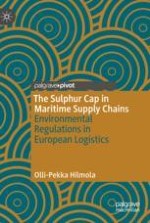2019 | OriginalPaper | Buchkapitel
3. Was Sulphur Regulation the Reason for Growth of Unitized Cargo Between Finland and Estonia?
verfasst von : Olli-Pekka Hilmola
Erschienen in: The Sulphur Cap in Maritime Supply Chains
Aktivieren Sie unsere intelligente Suche, um passende Fachinhalte oder Patente zu finden.
Wählen Sie Textabschnitte aus um mit Künstlicher Intelligenz passenden Patente zu finden. powered by
Markieren Sie Textabschnitte, um KI-gestützt weitere passende Inhalte zu finden. powered by
